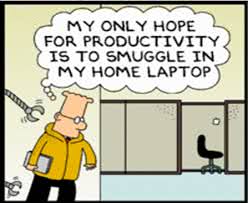A Closer Look at the Consumerization of IT

Almost everyone has a smartphone, tablet, or laptop. Now, more and more employees are bringing these personal devices into the workplace and using applications such as Twitter and Facebook in the enterprise. Say hello to the consumerization of IT. According to a recent Gartner study, the consumerization of IT is one of the most significant trends that will be affecting IT for the next ten years. More than another industry buzzword, the consumerization of IT is changing the way employees work and the role of IT within the enterprise.
What is the Consumerization of IT?
The consumerization of IT does not refer to a particular technology or software; instead, it refers to the use of consumer technologies and devices, such as iPhones, iPads, and other mobile devices within the enterprise. The consumerization of IT is not limited to the use of devices; it also encompasses services such as social media networks and online data storage.
The consumerization of IT has been driven by the wide adoption and use of mobile devices. Employees use such devices in their personal time and have begun to use them in a professional context within the workplace. In a recent study commissioned by DELL KACE, 87% of the executives surveyed found that their employees were using personal mobile devices for work-related activities, from simple tasks such as emailing to ERP and CRM functions.
The consumerization of IT has also been facilitated by the growth of cloud computing. People can access applications and social networks from anywhere and at anytime using their mobile device and an Internet connection.
What the Consumerization of IT Means for Business
Just as social media has changed the way businesses interact with their customers, the consumerization of IT has changed the way employees use technology and their relationship with IT. What does this mean for the enterprise?
For one, more and more business software vendors are creating mobile-ready versions of their applications. These vendors are also creating applications with user-friendly interfaces that mimic popular consumer-facing websites like Amazon or Facebook. More and more, technology is being driven by the user and the consumer than by the IT department. In addition, the consumerization of IT can help businesses improve collaboration between employees and increase productivity.
However, the consumerization of IT also has some potential drawbacks that have kept some CIOs from fully embracing the trend. With employees connecting to the corporate network on their personal devices, IT assets are brought outside the firewall, creating the potential for a security breach or intellectual property theft.
Final Thoughts
According to the stats, the consumerization of IT is taking a hold in the enterprise. And this trend means more than just using Twitter and Facebook while at work. Mobile devices and cloud computing are becoming the norm, rather than the trend, within businesses. The consumerization of IT is a natural offshoot of this.
However, not all employees, IT departments, or organizations may want to adopt this trend of “bringing your own device” to work. Being able to access the corporate network while on the field is useful for someone like a sales representative who must access critical information about customers. But providing such remote access also opens the door for security and privacy issues. And, do employees really want to be connected to work 24/7 on their mobile devices? This may be great for the business, but not so much for the employee.
Want to access more information on top industry trends and news? Browse our complete collection of software news by visiting the News & Trends section of the Business-Software.com blog.
[Photo courtesy of Bertrand Duperrin’s Notepad.]





